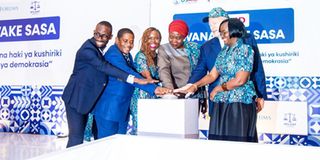US champions Sh8 billion project to elevate Tanzanian women in politics

What you need to know:
- Called Wanawake Sasa (Women Now), the project wants to advance women and girls’ political participation and leadership.
Dar es Salaam. The United States Agency for International Development (USAID) has launched a Sh8 billion ($3 million) project which seeks to break down gender barriers and elevate the women in the Tanzanian political leadership.
Called Wanawake Sasa (Women Now), the project wants to advance women and girls’ political participation and leadership.
USAID Tanzania mission director Craig Hart accompanied the Minister for Community Development, Gender, Women, and Special Groups, Dr Dorothy Gwajima in inaugurating the initiative.
“The USAID Wanawake Sasa project expands on the United States global commitment to empower women and girls and its partnership with Tanzania. This initiative seeks to break down gender barriers and ensure that the leadership and voices of all Tanzanians—especially women and girls—are not only heard but also play a key role in the nation's political decision-making processes,” the US embassy in Tanzania said in a statement.
“Tanzania thrives when all voices are heard, and where women are fully empowered to shape the nation's future,” said Mr Hart.
“Through USAID Wanawake Sasa, together, we are taking a clear step to making this not just a goal, but a lived reality,” he added.
The project seeks to support the agency of women and girls to participate in civic and political spaces. It will work with communities, civil society, and government to foster more inclusive governance, and prevent all forms of gender-based violence.
It will be implemented in four regions in Tanzania mainland, including Arusha, Dar es Salaam, Iringa, and Mwanza, and in Zanzibar.




